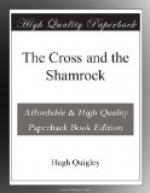Fervently did that priest, who thanked God that he was on hand, pray, not that God would restore him to his wife and children,—for all hope of recovery was now gone,—but that, in accordance with the anxious desire of the dying man, he should have the privilege of burial in a Christian, consecrated tomb.
“Pray, father,” said he, “that, if it be God’s holy will, I may be buried in a consecrated soil. It seems to me a sort of profanation, that the cruel fishes and those monsters of the deep, which we see leaping around the vessel, should devour my flesh, united with, and I hope sanctified now by, the flesh and blood of my Lord.”
The priest did pray, and the people joined in that impulsive prayer of faith, and that prayer was heard; for, though O’Clery breathed his last on board, and, by the captain’s orders, the sailors—poor fellows!—were standing around his berth, prepared, as soon as the last breath left him, to throw him overboard, yet he lingered for three days after; and they reached quarantine before that pure soul quitted its tenement of clay and winged its flight to heaven. The wife and her children had the body conveyed to shore and interred in the Catholic cemetery of New York, where a neat marble monument could be seen with these words inscribed:—
"Pray for the soul of Arthur O’Clery, whose body lies underneath. Requiescat in pace. Amen."
It was thus that the O’Clerys were deprived of their good and virtuous father, and the widow of her husband; but this, as already has been partly seen, was but the beginning of their woes; for, after their arrival in New York, an individual, who, during the voyage, ingratiated himself with the family by his attention around the sick man’s bed, joined them at their lodgings. But in a few days they found him gone one morning, after their return from mass at Barclay Street Church, and with him the canvas bag, containing the thousand pounds in gold and Bank of England notes left by them in a trunk. Thus were six persons, strangers and destitute in a great city, reduced from competency to poverty at “one fell swoop” by the villany of a pretended friend and associate.
“O Lord, pity me! One misfortune never comes alone,” groaned the now poor and afflicted widow O’Clery, when she was informed by little Bridget that the “trunk was broke open,” and all the things ransacked “through and fro.”




